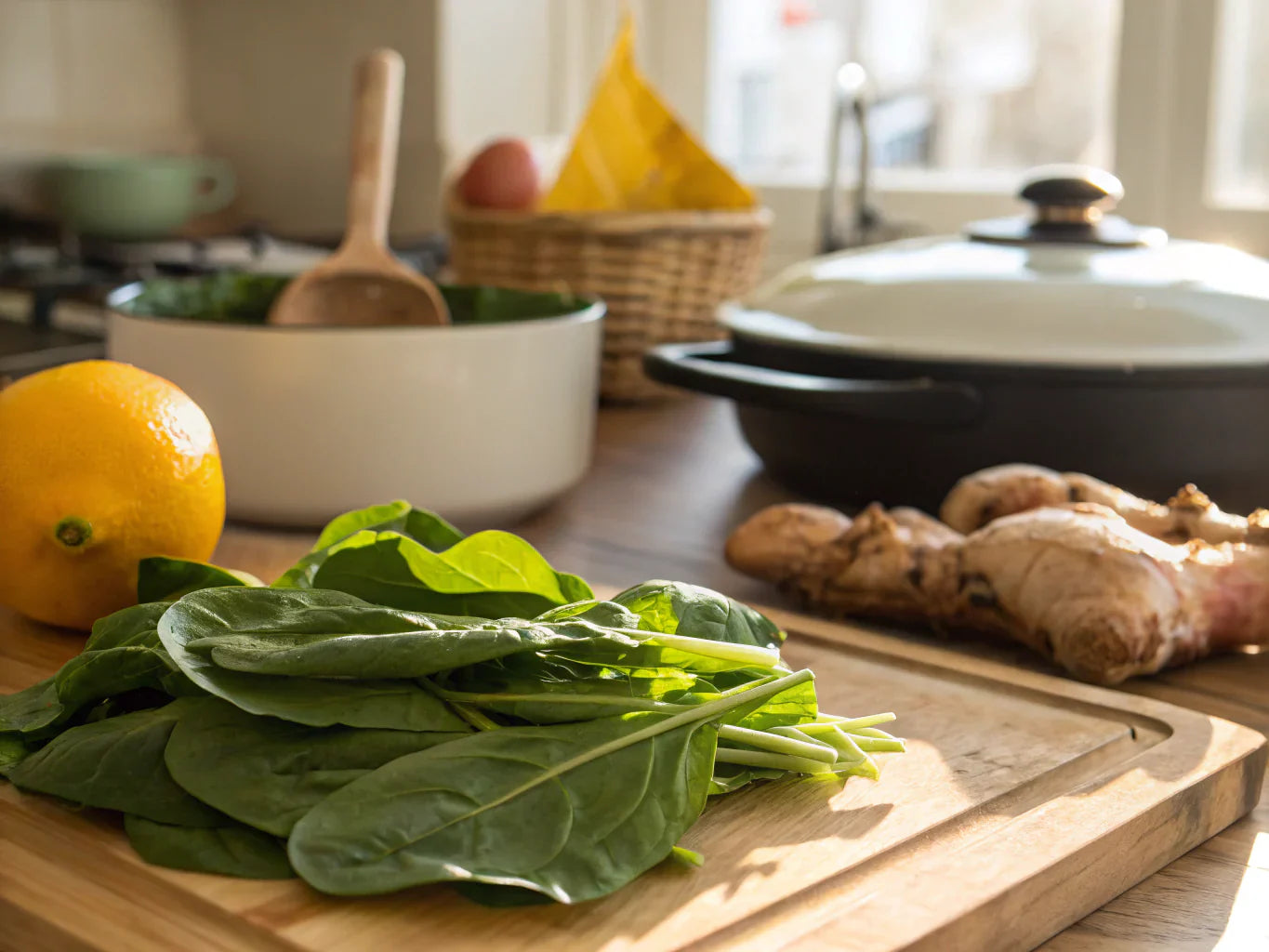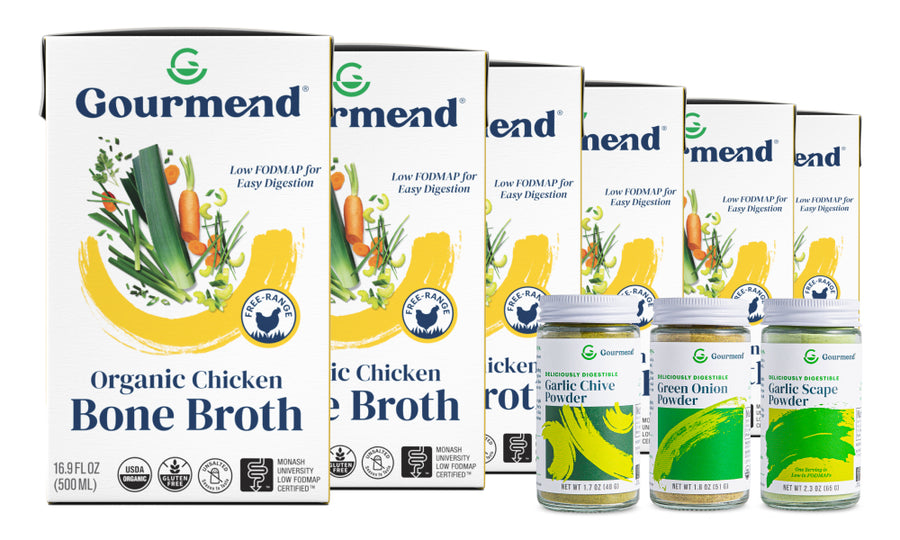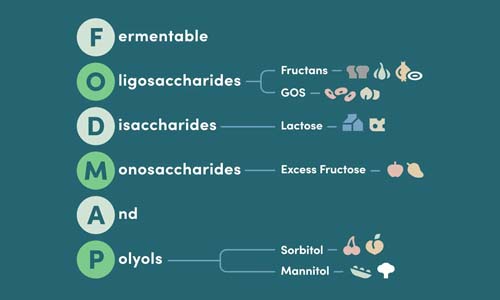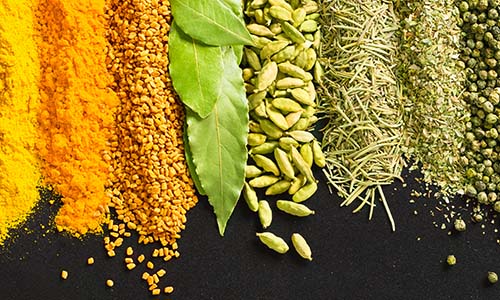Is Spinach Low FODMAP? Your Essential Digestive Guide

If you're following a low FODMAP diet to manage IBS symptoms, you might be wondering: is spinach low FODMAP? The good news is that spinach is generally low FODMAP and can be enjoyed by most people with digestive sensitivities. However, the type of spinach and serving size matter more than you might think.
Key Takeaways
- Spinach is generally low FODMAP and suitable for most people managing IBS symptoms.
- The type of spinach consumed can affect its FODMAP content.
- Serving size plays an important role in whether spinach remains low FODMAP.
- Individuals with digestive sensitivities can often enjoy spinach safely.
Table of Contents
- Understanding FODMAPs and Digestive Health
- Spinach FODMAP Content Breakdown
- Nutritional Benefits of Low FODMAP Spinach
- Incorporating Spinach into Low FODMAP Meals
- Cooking Techniques for Better Digestibility
- Portion Control and Symptom Management
- Family-Friendly Low FODMAP Spinach Recipes
- Supporting Your Low FODMAP Journey
With nearly 1 billion people worldwide living with IBS and two-thirds of Americans experiencing digestive issues, understanding which vegetables are gentle on your gut becomes crucial for maintaining both nutrition and quality of life. Spinach, packed with essential vitamins and minerals, doesn't have to be off-limits when you're managing digestive symptoms. For more information on FODMAPs and digestive health, you can visit Monash University's FODMAP resource.
Understanding FODMAPs and Digestive Health
FODMAPs are short-chain carbohydrates that can trigger uncomfortable symptoms like bloating, gas, and abdominal pain in sensitive individuals. The acronym stands for Fermentable Oligosaccharides, Disaccharides, Monosaccharides, and Polyols—essentially, certain sugars and fibers that your gut bacteria ferment rapidly.
When these compounds reach your large intestine undigested, they draw water into the bowel and produce gas as bacteria break them down. For people with IBS, this process can cause significant discomfort. The low FODMAP approach helps identify which specific foods trigger your symptoms through a structured elimination and reintroduction process.
The diet typically involves a restriction phase lasting 2-6 weeks, where you minimize fermentable carbs to give your digestive system a break. This isn't meant to be a permanent way of eating—staying too restrictive for too long can lead to nutrient deficiencies and negatively impact your gut bacteria diversity.
Spinach FODMAP Content Breakdown
Not all spinach is created equal when it comes to fodmap spinach content. According to Monash University research, the FODMAP levels vary significantly between different types of spinach.
English (Mature) Spinach
This is your best bet for unlimited enjoyment. English spinach shows no detectable FODMAPs, meaning you can eat generous portions without worrying about triggering symptoms. A typical serving of about 75 grams (roughly 2 cups raw) is completely gentle on digestion.
Baby Spinach
Baby spinach requires a bit more attention to portion sizes. It's low FODMAP up to 75 grams (about 1½ cups raw), but larger servings of 150 grams or more contain moderate levels of fructans. If you're particularly sensitive, stick to smaller portions or mix baby spinach with other low FODMAP greens.
Water Spinach
Popular in Southeast Asian cuisine, water spinach is remarkably low FODMAP even in large servings up to 500 grams. This makes it an excellent choice for those who want to load up on leafy greens without digestive concerns.
Nutritional Benefits of Low FODMAP Spinach
Spinach low FODMAP varieties deliver impressive nutritional value without the digestive drama. You're getting a powerhouse of vitamins A, C, E, and K, plus essential minerals like iron, folate, and potassium. The omega-3 fatty acids and antioxidants support overall health while being gentle on sensitive digestive systems.
The fiber content in spinach also provides prebiotic benefits, supporting healthy gut bacteria diversity—something that's particularly important when you're managing IBS symptoms. Rather than avoiding vegetables due to digestive concerns, incorporating spinach helps maintain the nutritional foundation your body needs for optimal gut health. If you're looking for more low FODMAP meal inspiration, check out our low FODMAP recipes blog.
Incorporating Spinach into Low FODMAP Meals
The beauty of spinach fodmap compatibility lies in its versatility across every meal of the day. Whether you're dealing with morning digestive sensitivity or planning a family dinner that works for everyone, spinach adapts beautifully to your cooking needs.
Breakfast Spinach Options
Start your day by adding baby spinach to lactose-free smoothies with banana and your favorite low FODMAP fruits. The mild flavor blends seamlessly while boosting your morning nutrition. You can also fold spinach into omelets with aged cheese and herbs, or create a quick sauté with eggs for a protein-rich breakfast that's gentle on digestion.
Main Meal Preparations
For lunch and dinner, spinach shines in countless applications. Toss it into pasta dishes with olive oil and lemon zest, or create vibrant salads using the green parts of scallions instead of onions for that savory bite. Spinach works beautifully in stir-fries with tofu and other low FODMAP vegetables, providing both color and nutrients without digestive stress. For a delicious and easy low FODMAP pasta idea, try our Low FODMAP Broccoli Sausage Pasta recipe.
Cooking Techniques for Better Digestibility
While raw spinach offers maximum nutrients, cooking can make fodmaps spinach even gentler on sensitive digestive systems. The cooking process breaks down some of the fiber structure, making it easier for your gut to process without triggering uncomfortable symptoms.
Light sautéing with a quality oil preserves most nutrients while improving digestibility. We often recommend using our Low FODMAP Organic Vegetable Broth as a cooking liquid—they're made with chives and the green parts of scallions instead of onions, plus nori seaweed and oyster mushrooms for natural umami. This creates deeply flavorful spinach dishes without any FODMAP triggers.
Steaming is another excellent option that maintains nutritional value while making spinach more digestible. The gentle heat softens the leaves without leaching water-soluble vitamins, giving you the best of both worlds—nutrition and comfort.
Portion Control and Symptom Management
Even with low FODMAP spinach varieties, gradually increasing your intake helps prevent digestive discomfort. If you're not accustomed to eating lots of leafy greens, start with smaller portions and build up over time. Your gut bacteria need time to adjust to increased fiber intake.
Pay attention to how different preparations affect you personally. Some people find raw baby spinach more challenging than cooked mature spinach, while others tolerate both equally well. The reintroduction phase of the low FODMAP diet is perfect for testing your individual tolerance levels.
Remember that combining spinach with other gut-friendly ingredients can enhance both flavor and digestibility. Pairing it with easily digestible proteins and healthy fats creates balanced meals that support your overall digestive wellness while delivering the nutrition your body craves. For more tips on building a gut-friendly pantry, explore our Pantry Starter Pack.
Family-Friendly Low FODMAP Spinach Recipes
Creating meals that work for both your digestive needs and your family's taste preferences doesn't require compromise. These spinach low fodmap recipes prove that gut-friendly cooking can be delicious for everyone at the table.
Creamy Spinach and Parmesan Pasta
This rich pasta dish combines mature spinach with lactose-free cream and aged parmesan for deep, satisfying flavor. The spinach wilts beautifully into the sauce, creating a restaurant-quality meal that's gentle on digestion while appealing to even picky eaters. For a creamy, umami-packed base, try using our Low FODMAP Organic Chicken Broth in your sauce.
Spinach and Feta Stuffed Chicken
Butterfly chicken breasts and stuff them with a mixture of sautéed spinach, crumbled feta, and fresh herbs like chives. This protein-rich dinner looks impressive but comes together quickly, delivering Mediterranean flavors without any FODMAP triggers. For a convenient way to get started with low FODMAP cooking, consider our Low FODMAP Starter Bundle.
Asian-Inspired Spinach Stir-Fry
Using sesame oil and the green parts of scallions, this quick stir-fry transforms simple spinach into a flavorful side dish. Add some tofu or your favorite protein, and finish with a splash of our Low FODMAP Organic Vegetable Broth for extra umami depth.
Spinach and Strawberry Salad
Fresh baby spinach paired with sliced strawberries, pine nuts, and a simple olive oil vinaigrette creates a perfect balance of sweet and savory. This colorful salad works beautifully as a light lunch or elegant dinner starter. For a delicious salad dressing, try our Low FODMAP French Vinaigrette recipe.
Breakfast Spinach Scramble
Sauté mature spinach with chives and fold into scrambled eggs with a sprinkle of aged cheese. This protein-packed breakfast provides sustained energy while being completely gentle on your digestive system.
Supporting Your Low FODMAP Journey
Managing IBS symptoms while maintaining nutritional variety requires both knowledge and the right ingredients. That's where clean-label, organic products make a real difference—they eliminate the guesswork around hidden additives and artificial ingredients that could trigger symptoms.
At Gourmend Foods, we understand that cooking with digestive sensitivities shouldn't mean sacrificing flavor or convenience. Our bone broths and seasonings are specifically crafted to support your low FODMAP lifestyle while delivering the rich, complex flavors that make cooking enjoyable. Visit our low FODMAP recipes page for more inspiration and practical cooking guidance.
Remember, spinach is low fodmap and incredibly versatile, making it one of your most reliable allies in creating satisfying, gut-friendly meals. Whether you choose mature spinach for unlimited servings or stick to appropriate portions of baby spinach, you're supporting both your digestive health and overall nutrition. With the right approach and quality ingredients, managing IBS doesn't mean limiting your culinary horizons—it means discovering new ways to enjoy the foods that truly nourish you. For more educational resources, visit our Learn blog.
Check out our Low Fodmap Organic Vegetable Broth
Frequently Asked Questions
Is spinach ok for IBS?
Spinach is generally considered safe for most people with IBS when consumed in moderate amounts. It is low in FODMAPs, particularly in smaller servings, making it a suitable leafy green for those managing IBS symptoms. However, individual tolerance can vary, so it’s best to introduce spinach gradually and monitor how your body reacts.
What greens are low in FODMAP?
Several greens are low in FODMAPs and can be included in a low FODMAP diet, such as spinach, kale, arugula, and lettuce varieties like butterhead and iceberg. These greens are typically well-tolerated and provide essential nutrients without triggering digestive discomfort. Always keep portion sizes in mind, as large servings can sometimes increase FODMAP intake.
What vegetables should you avoid on a low FODMAP diet?
On a low FODMAP diet, it’s best to avoid vegetables high in fermentable carbohydrates, such as onions, garlic, cauliflower, mushrooms (except oyster mushrooms), asparagus, and Brussels sprouts. These vegetables can cause bloating, gas, and other IBS symptoms due to their high fructan or polyol content. Choosing alternatives that are low FODMAP can help manage symptoms more effectively.
Are carrots high in FODMAP?
Carrots are low in FODMAPs and are generally safe to eat for those following a low FODMAP diet. They provide a good source of fiber and vitamins without causing typical IBS symptoms associated with high FODMAP foods. Both raw and cooked carrots are well tolerated in moderate portions.
What food calms an IBS flare-up?
During an IBS flare-up, soothing foods like oatmeal, bananas, rice, and low FODMAP vegetables such as zucchini can help calm symptoms. These foods are gentle on the digestive system and less likely to cause irritation or gas. Additionally, staying hydrated and avoiding spicy, fatty, or highly processed foods can also support symptom relief.
Is spinach good for inflamed colon?
Spinach contains antioxidants and anti-inflammatory compounds that can be beneficial for an inflamed colon. Its rich nutrient profile supports overall gut health and may help reduce inflammation when included as part of a balanced diet. However, during severe inflammation or flare-ups, it’s important to consider personal tolerance and consult with a healthcare provider.





